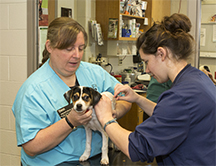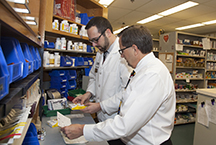Purdue offers new residency, special training in veterinary pharmacy
October 22, 2014
 |
|
Purdue Small Animal Community Practice technologist Saralyn Sharp (left) guides veterinary technology student Sarah Sloan through the process of administering a vaccine to a Beagle mix named Milo. As the number of available vaccines, treatments and medicines for pets increases, so does the demand for pharmacists with special training in animal health. Purdue is launching a new residency program in veterinary clinical pharmacy practice. (Purdue University photo/Kevin Doerr) |
WEST LAFAYETTE, Ind. — Purdue University next summer will become the nation's third university offering a residency program in veterinary clinical pharmacy practice, which provides pharmacists special training in animal health.
Demand for pharmacists with training in veterinary care and therapeutics has grown alongside increases in the treatments and medicines available for pets, said Brian Shepler, director of advanced pharmacy practice experiences and assistant dean for experiential education in Purdue’s College of Pharmacy.
"Pharmacists and veterinarians share the same goal for their patients: to offer the best and most successful treatments to them," said Shepler, who helped develop the new residency. "Whether filling a prescription for Frank or Fido, a pharmacist's role is to ensure that a medication and its dosage are safe and appropriate for a patient, to check for any potentially harmful interactions, and to offer advice on ways to minimize discomfort from side effects. This residency provides training to pharmacists so that they can help ensure an animal's safety and provide optimum care."
Retail sales of pet medications in the U.S. reached $8 billion in 2013 and are projected to reach $10 billion by 2018, according to the market research company Packaged Facts.
In addition to a growing need for those trained to dispense medications to animals, there is an increasing demand for those who can prepare the medications, said Wil Gwin, the pharmacy director at Purdue's Veterinary Teaching Hospital who also helped develop the new residency program.
"As you can imagine, there is a great variation in prescribed doses from Chihuahua to Great Dane and from dog to cat to bird or guinea pig," Gwin said. "The drug manufacturers don't provide the medication in each of these doses, so many of the medications dispensed to animals must be specially prepared for each prescription. There also are different toxicities that need to be taken into account. A sweetener that helps your child's medicine taste better can be fatal to dogs."
 |
|
Wil Gwin (right), pharmacy director at Purdue's Veterinary Teaching Hospital, guides Purdue pharmacy student Jonathan Sarky as he fills a prescription during a clinical rotation in the hospital's pharmacy. Purdue will become the nation’s third university offering a residency program in veterinary clinical pharmacy practice to provide pharmacists special training in animal health. (Purdue University photo/Kevin Doerr) |
Graduates of Purdue's residency program will have knowledge and skills that will make them valuable assets to the veterinary pharmaceutical industry, regulatory agencies, colleges of pharmacy and colleges of veterinary medicine. Last year 36 pharmacists applied for the two available positions within such residencies in the nation, Gwin said.
The residency is co-sponsored by Purdue's College of Pharmacy and College of Veterinary Medicine, which both are ranked among the top in the nation. Faculty from both colleges will participate in training residents.
During the one-year residency a pharmacist will participate in rotations in the various departments of Purdue's Veterinary Teaching Hospital, which serves as a major referral center for the diagnosis and treatment of diseases of all species of companion and food animals, as well as exotic pets and wildlife.
Residents will learn the anatomy, physiology and different ways drugs are metabolized and act within different species, and to prepare high-quality, safe and effective compounded preparations for animal patients. Residents also will learn the regulations and ethical responsibilities of drug use in animals and will gain experience in designing and performing clinical pharmacology research.
The additional training and education will prepare residents for certification by the Society of Veterinary Hospital Pharmacists and as a diplomate of the International College of Veterinary Pharmacy.
Purdue is offering one residency position beginning in July 2015. Applicants must have a doctor of pharmacy degree and be eligible for licensure to practice pharmacy in Indiana. Those interested in applying should contact Wil Gwin directly at wegwin@purdue.edu.
Writer: Elizabeth K. Gardner, 765-494-2081, ekgardner@purdue.edu
Sources: Brian Shepler, 765-494-1365, sheplerb@purdue.edu
Wil Gwin, 765-494-7622, wegwin@purdue.edu

